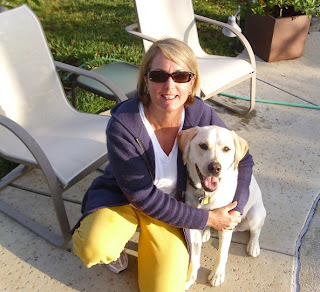 Coll, on how she was united with Zoe:
Coll, on how she was united with Zoe:There’s no great romantic story behind Zoe’s arrival in my life, apart from having three young kids at the time who were taping pictures of puppies to the mirrors and windows and doors of the house in a not very subtle ploy to wear down their parents. We finally drove out to the Maryland countryside and found Zoe on a farm. She was the only puppy left from a recent litter, and neither her mother nor father was around. She seemed a bit forlorn, and was also a complete mess, really mangy and smelly. We...[read on]Susan Coll is the author of the novels Acceptance, karlmarx.com, Rockville Pike, and the newly released Beach Week. A film adaptation of Acceptance, starring Joan Cusack, aired on Lifetime Television in 2009.
Among the early praise for Beach Week:
“A taut, terrifying thriller that will greatly amuse anyone who doesn’t have children. Beach Week is a must-read for any parent whose teenager wants to go on a senior trip, or even out of the house.”Visit Susan Coll's website and blog.
—Larry Doyle, author of I Love You, Beth Cooper“Like a rogue ocean wave or a deer through your windshield on a lonely shore road, Beach Week packs a punch. There’s hilarious hypocrisy and satire as sharp as a glass shard on the boardwalk—Susan Coll is very funny as she lightly barbeques a suburban summer tradition. Yes, that’s vodka in the water bottles, and yes, that’s an Ivy League–bound teen in a steamy bathroom clinch: it’s time to swap the rose-colored glasses for sunglasses and a pitcher of blue Kool-Aid margaritas.”
—Helen Simonson, author of Major Pettigrew’s Last Stand
“Hysterically funny.”
—Kirkus Reviews
Read--Coffee with a Canine: Susan Coll & Zoe.
--Marshal Zeringue








































 About the book
About the book




